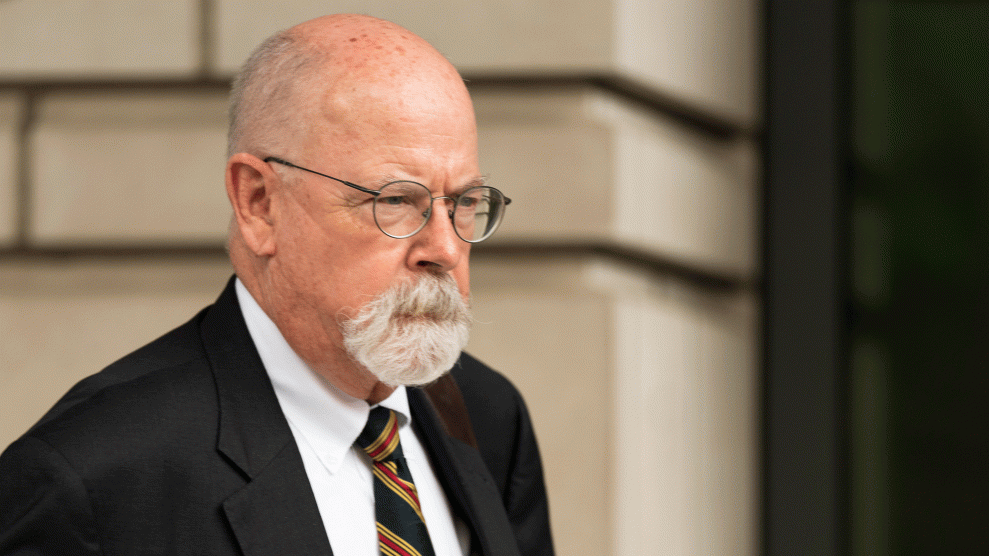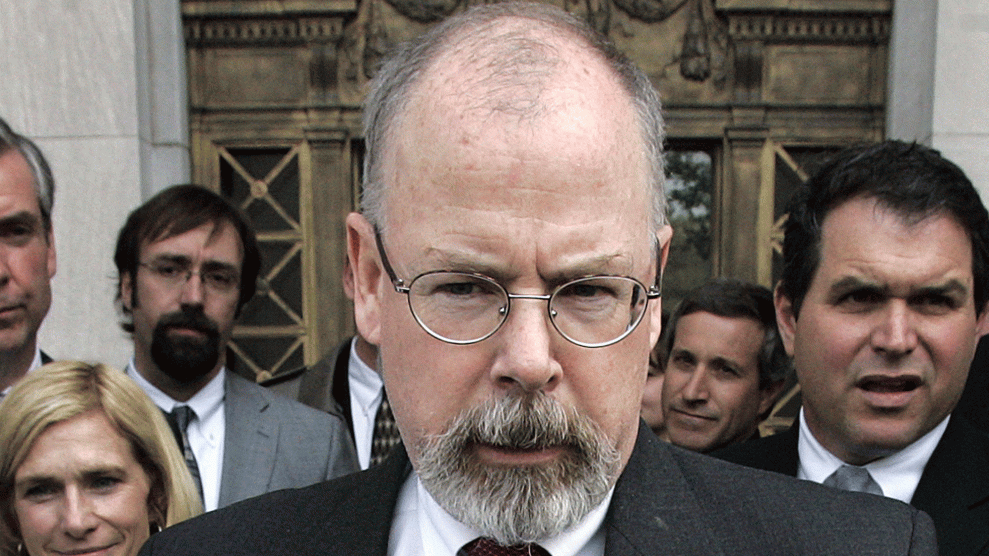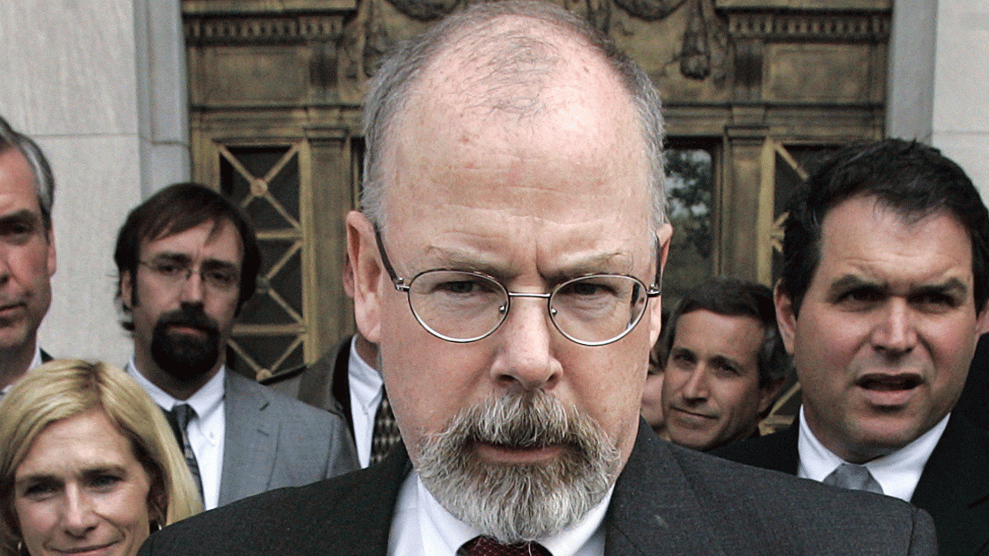
Special counsel John Durham leaves federal court in Washington last month.Manuel Balce Ceneta/AP
Donald Trump has bad timing. On Friday, he sent a letter to the Pulitzer Prize Board reiterating his demand that it rescind the awards given to the New York Times and the Washington Post in 2018 for their coverage of the Trump-Russia scandal. (That’s not what he called it.) He based this request on the prosecution of Democratic lawyer Michael Sussmann, who was indicted by special counsel John Durham for allegedly lying to the FBI during a September 2016 meeting when he shared with the bureau computer data research that suggested there might be a connection between a Trump-related business and Alfa Bank, a large Russian financial entity. Trump claimed the Sussmann case showed the “Russia hoax was a dirty campaign trick promulgated by Crooked Hillary Clinton and her associates.” Five days later, the jury, after only several hours of deliberation, acquitted Sussmann. Oops.
The quick not-guilty verdict was a sharp slap at Durham’s three-year-long investigation, which was launched by William Barr, when he was Trump’s loyalist attorney general, and which has come across as a political crusade mounted to undermine the various Trump-Russia investigations. Durham was tasked by Barr to investigate the origins of the FBI’s probe of the Russian attack on the 2016 election (which, according to multiple investigations, was waged to help Trump win) and the interactions between Trump associates and Russian operatives. Put simply, Durham’s job was to find that Trump had been set up by the bureau. When the Justice Department inspector general in late 2019 issued a report concluding the FBI had legitimate cause to investigate the Russian assault and the Trump campaign, Durham, in an unusual move, released a statement declaring, “we do not agree with some of the report’s conclusions as to predication and how the FBI case was opened.” A-ha, Trumpists exclaimed. Durham was on track to reveal that the FBI investigation was bogus from the get-go and Trump was right: It was all a hoax and a witch hunt.
Yet after years of toil, Durham has produced nothing to suggest the Russia investigation was a Deep State hit-job against Trump. He has brought three cases that have nothing to do with the origins of the investigation. One involved an FBI lawyer who altered an email used to obtain a search warrant after the investigation was started. (The attorney pleaded guilty and was sentenced to a year of probation.) Another led to the indictment of Igor Danchenko, a source for the so-called Steele dossier, for allegedly lying to the FBI about his sources. His trial is scheduled to begin in October. This prosecution, too, has nothing to do with the origin or legitimacy of the FBI’s investigation, which was not triggered by the Steele reports. The third was the Sussmann case that just exploded in Durham’s face. It, too, was essentially unconnected to the FBI’s core investigation, given that the meeting in question happened months after the bureau began examining the Russian assault and that the FBI quickly dismissed the Trump-Alfa Bank tie.
Despite declaring over two years ago that he had reason to question the FBI’s opening of the Russia investigation, Durham has failed to make good on his assertion. His investigation has yielded zilch in this regard. His prosecutions are all sideshows.
But Durham has done Trump and his cultists a great favor by providing material they can exploit for one of their favorite pastimes: deflection.
For over five years, Trump and his minions have endeavored to beat back the Trump-Russia scandal with denial and distraction. They have done all they could to change the subject from the basics of the affair: the Kremlin attacked the 2016 election to help Trump; while this assault was underway, the Trump camp had troubling interactions with Russian operatives and was told the Kremlin intended to covertly assist Trump; Trump hid from the public his effort to land a major development deal in Moscow (for which he sought help from Vladimir Putin); the Trump campaign aided and abetted the Russian attack by denying and/or downplaying it; and, as president, Trump tried to impede the investigation. All of these are confirmed facts that make a damning case that Trump committed a grand act of betrayal to become president. Trump and his defenders, though, have tried to change the subject: the problematic Steele dossier, an improperly obtained search warrant, baseless conspiracy theories about the Democratic Party’s computer servers being whisked away to Ukraine, and, most recently, the Sussmann meeting.
Look at Trump’s letter to the Pulitzer board. It dwells on details that came out during the Sussmann trial about the Clinton campaign promoting the Alfa Bank allegation. This case, Trump claims, shows that Clintonites were trying to spread opposition research about him, particularly iffy data about a purported computer server tie between his business and Alfa Bank. He declares he was the victim of “shameful smears” from the Clinton campaign—and these covert attacks were the basis for the FBI investigation. The Clinton crew, of course, was trying to disseminate negative information about Trump—especially worrisome material about a possible Trump-Russia connection. But this had nothing to do with the investigation already begun by the FBI, which was launched independently of the Clinton effort.
Trump writes, “I again call on you to rescind the Prize you awarded based on blatantly fake, derogatory and defamatory news. If you choose not to do so, we will see you in court.” Putting aside whether Trump can sue a journalism awards committee for content it honors, he is yet again engaging in deflection. Nothing in the Sussmann case undercuts the investigations or the reporting related to the central elements of the scandal. Trump is trying to turn the thin gruel Durham has served up into a feast.
In the reality-based world, Durham actually has undermined Trump and his bogus narrative. He has failed to demonstrate that the Russia investigation was a witch hunt or hoax cooked up by Trump’s enemies. His small-beer cases do not challenge any of the main findings of the investigations, which justifiably taint Trump’s 2016 victory and presidency. Durham’s work (so far) shows that Trump’s attempts to distract from the scandal have been nothing but a big con. Trump shrieks about Sussmann, the Steele dossier, and other matters so the public doesn’t see what’s clearly there: a record of misdeeds, lies, and treachery. In a way, Durham has provided a valuable service. His inability to uncover evidence of a hoax confirms that Trump’s denials and diversions have been the real hoax all along.








